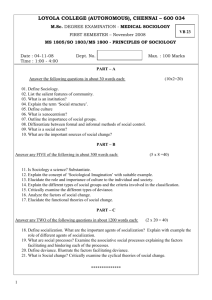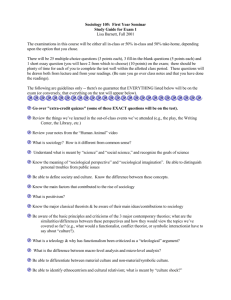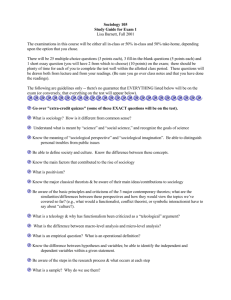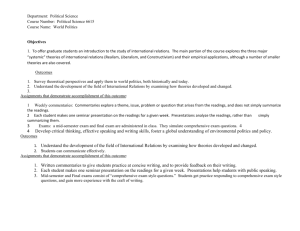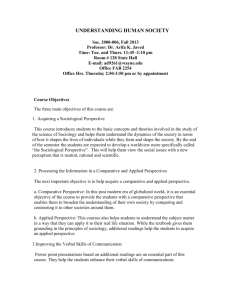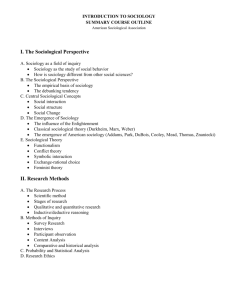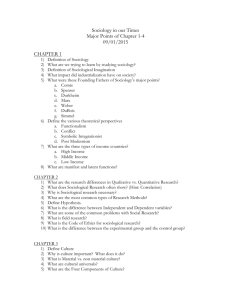SYG 1000-02 Introduction to Sociology
advertisement
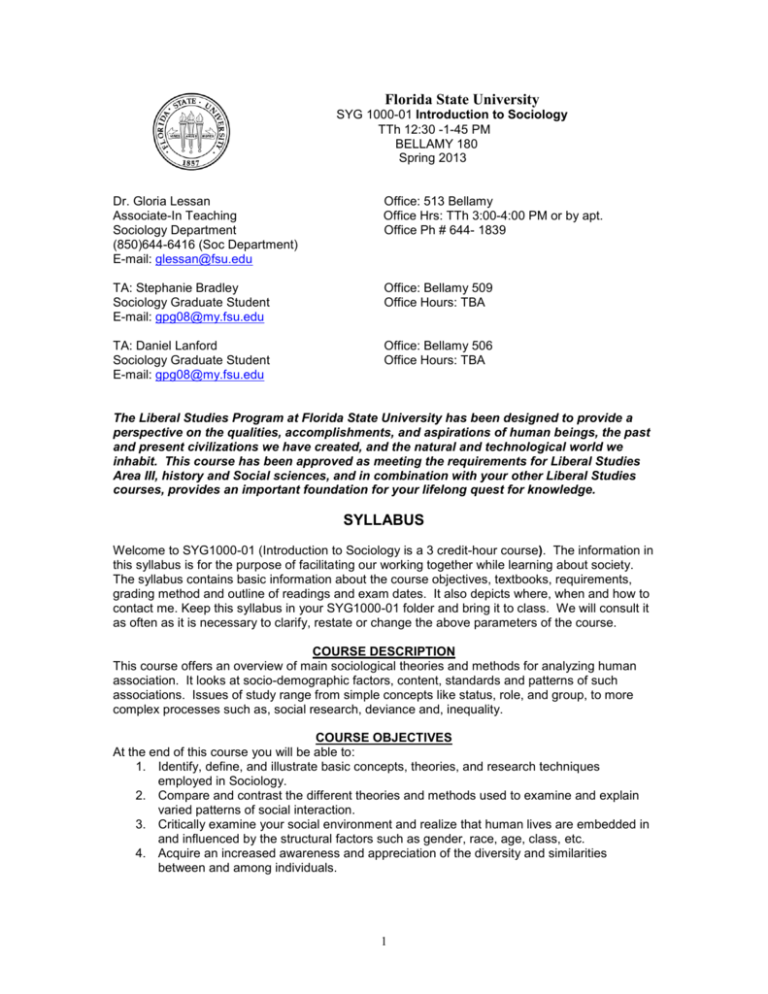
Florida State University SYG 1000-01 Introduction to Sociology TTh 12:30 -1-45 PM BELLAMY 180 Spring 2013 Dr. Gloria Lessan Associate-In Teaching Sociology Department (850)644-6416 (Soc Department) E-mail: glessan@fsu.edu Office: 513 Bellamy Office Hrs: TTh 3:00-4:00 PM or by apt. Office Ph # 644- 1839 TA: Stephanie Bradley Sociology Graduate Student E-mail: gpg08@my.fsu.edu Office: Bellamy 509 Office Hours: TBA TA: Daniel Lanford Sociology Graduate Student E-mail: gpg08@my.fsu.edu Office: Bellamy 506 Office Hours: TBA The Liberal Studies Program at Florida State University has been designed to provide a perspective on the qualities, accomplishments, and aspirations of human beings, the past and present civilizations we have created, and the natural and technological world we inhabit. This course has been approved as meeting the requirements for Liberal Studies Area III, history and Social sciences, and in combination with your other Liberal Studies courses, provides an important foundation for your lifelong quest for knowledge. SYLLABUS Welcome to SYG1000-01 (Introduction to Sociology is a 3 credit-hour course). The information in this syllabus is for the purpose of facilitating our working together while learning about society. The syllabus contains basic information about the course objectives, textbooks, requirements, grading method and outline of readings and exam dates. It also depicts where, when and how to contact me. Keep this syllabus in your SYG1000-01 folder and bring it to class. We will consult it as often as it is necessary to clarify, restate or change the above parameters of the course. COURSE DESCRIPTION This course offers an overview of main sociological theories and methods for analyzing human association. It looks at socio-demographic factors, content, standards and patterns of such associations. Issues of study range from simple concepts like status, role, and group, to more complex processes such as, social research, deviance and, inequality. COURSE OBJECTIVES At the end of this course you will be able to: 1. Identify, define, and illustrate basic concepts, theories, and research techniques employed in Sociology. 2. Compare and contrast the different theories and methods used to examine and explain varied patterns of social interaction. 3. Critically examine your social environment and realize that human lives are embedded in and influenced by the structural factors such as gender, race, age, class, etc. 4. Acquire an increased awareness and appreciation of the diversity and similarities between and among individuals. 1 5. Write and think critically via class discussions, written assignments, and exams about the concepts, theories, and research techniques in the field. REQUIRED TEXTBOOKS The text below is available at Bill’s and FSU Bookstores 1) Giddens, Anthony, Mitchell Duneier, and Richard P Appelbaum, 2012. Introduction to th Sociology, (8 edition) W. W. Norton and Company. This textbook is identified in the Course Outline (pp.5-8) as Giddens et al. 2) Additional Readings and Lecture Notes for specific topics are posted on Blackboard/Course Library COURSE REQUIREMENTS Reading Assignments: Students are expected to have active and constructive class participation. Hence, assigned readings should be read prior to the corresponding class date depicted in the Course Outline below. Of course, additional readings are required before the tests. The complexity of the reading materials is appropriate for college freshmen. Thus, if at first you do not understand the material, you must reread it as many a times as it is necessary to accomplish understanding. In order to know whether you fully grasp the concepts and arguments presented in the readings I suggest to: 1) Write down summaries of the material read, 2) make questions out of the information presented, and 3) specify the particular issues that remain unclear. At any rate, whatever study method you use that brings you understanding of the readings is the best to follow. Make a habit of consulting a college-level dictionary and the glossary in the textbook to acquire familiarity with scientific terms and expand your vocabulary. In order to monitor the regularity of the reading assignments and attendance, you will be given open book assessments. The hard copy of your assessment will evince your classroom presence while the grade on it will count towards the final grade as class participation (see below). Class Participation: The study of society makes more sense when it is done interactively. Hence, you are to be an active participant during each class. Attend class having done the readings and other work assigned according to the Course Outline. In order to monitor the regularity of the reading assignments, you will be given assessments composed of five short-answer questions. The grades on the total number of assessments will account for 40% of the final grade. There are six assessments in the semester. I expect each of you to be prepared to answer questions on assigned readings and to turn in work on due dates as listed in Course Outline below. My role is to generate and steer the discussion of the material always within a civil and respectful atmosphere. Therefore, do not fail to participate for fear of what others may think. Remember there are always other students who are in your same situation. If uncertainty and nervousness take over the class the course will be a total loss. Nothing will be gained from silence, passivity, apathy and lectures turned into monologues. Ask questions, answer questions, volunteer your views, make comments, be attentive to what others say, avoid using the class as a forum for your own agenda. Overall, cooperate in building a supportive learning environment that benefits us all by offering scholarly comments in a normal, non-aggressive manner and respectful of all. Exams: There are four exams in the semester. Each exam covers the assigned material listed in the Course Outline below. All exams are a combination of multiple-choice and true-false questions. All assigned readings, lecture and audio-visual presentations are potential material for exam. To facilitate the learning process you will be given a set of study-guide questions about ten 2 days before each test. Work on these questions as a study tool to self-evaluate your readiness for the test . Use the class time and office hours (both mine and the TA’s) to talk about your progress in preparing for the coming test. The study guide is NOT a contract that defines the exam! Rules regarding missed exams are described below Grading Method: Each test is 15% of the final grade or a total of 60% from all four. The class assessments contribute with the remaining 40%. Regardless of number of questions, all exams and assessments are graded on a scale of 0-100. The equivalence of numeric score to letter grade scales is as follows: 95-100 A Excellent, creative and superb command of the subject matter 90-94 ACreative and outstanding command of the subject matter 87-89 B+ Above average level but not outstanding grasp of the material 84-86 B Above average but thin understanding of some readings 80-83 BAbove average but misses some parts of the readings and thus is unable to apply subject matter at all levels 77-79 C+ Average level of achievement with some mastering yet narrow application of the material 74-76 C Average level of achievement; it refers to the readings in a superficial way suggesting spotty understanding of the material 70-73 CClose to average due to spotty understanding of the material and inability to apply readings 67-69 D+ Below average understanding, showing little knowledge of the material 64-66 D Below average level with multiple contradictory arguments 60-63 DBelow average understanding thus failure to apply readings 59 and below F Fails to understand and address the readings on the subject matter When scores include decimals, the rule is to round up from .45 and above; and to round down from .44 and below. Grades throughout the semester will be posted in the SYG 1000-06 Blackboard. Check this site on a regular basis and notify the TAs, Stephanie and Daniel or me of any problems regarding your grades as soon as these are posted. As a general rule talk to the TAs when you need help. Do so immediately, not at the end of the semester when it is TOO LATE! ESSENTIAL POLICY INFORMATION Attendance: Students are required to attend class and to do so on time. I will take attendance in two different ways: 1) via turned in class assessments on due dates and 2) by asking students to write down their names and last four digits of their SSN on a piece of paper. A student, who accumulates four or more unexcused absences recorded as above, will receive an F grade for the course. Keep track of your absences and notify the TA of every missed class right away according to criteria for excused absences below.. Since lectures deal with material and viewpoints other than the textbook, it is to your advantage to come to class in order to keep up with readings, note taking and course-related announcements. If you miss class for whatever reason, it is your responsibility to obtain lecture notes and information from your classmates. Remember that everything dealt with in class is potential material for exam. Excused Absences: The following AND only the following absences are eligible to be excused: - Religious holidays, as specified in FSU policy - Due to representing FSU at official functions, including intercollegiate debating or varsity sports events 3 Legitimate emergencies Legitimate medical illness. Medical illnesses are serious in nature and require continued treatment by medical professionals. Colds, the flu, fatigue, stress, “mental health daysoff” do not qualify as medical illnesses. If you have a chronic illness that could affect your attendance, it is imperative that you notify me of it at the beginning of class. For an absence to be excused documentation is required. This may include: doctor’s note legitimating the seriousness of illness and need of continued treatment, copy of obituary, court appointment, or police citation. - Rules regarding missing exams are discussed below. Courtesy: Coming in late for class or leaving before class dismissal, is rude and disruptive for all, more so in a mass class as this. Be courteous and avoid these behaviors. If for some legitimate reason, you foresee to be one-time late for class or to leave class early let me know in advance, and enter or leave the classroom as quietly as possible. Otherwise, chronic tardiness and chronic early departures are not accepted and will be penalized at my discretion. A final rule concerns with the use of cellular phones, pagers, beepers and laser pointers. Turn them off before entering the classroom and abstain from using them while attending class. Makeup Exams: ONE and ONLY ONE midterm makeup exam will be given IF and ONLY IF there is a legitimate reason (appropriate documentation is required) for missing the test. It is your responsibility to notify me and the TA why you are not taking the test. Do so prior to or no later than the next class after the scheduled test. In order to justify the absence from a test, students need to show documentation of its reason. This may include an obituary, court order, doctor-signed prescription/bill, or a document from an agency signed by a legitimate authority that fully describes the emergency causing the student’s missing the test. Turn in this documentation to the TA before taking the makeup exam. Contact the TA to learn about the date, time, and location of the makeup exam. The makeup exam may have a different format from the original i.e., essay questions. Student Conduct: My many years of college experience, both as student and instructor, have shown me that for the most part students are bright, good-natured and amiable toward others. In general you are expected to comply with the FSU Code of Conduct at all time while participating in FSU-related activities. Your behavior during class should be courteous, respectful and professional. In a nutshell, anyone who ignores my authority to protect the integrity of the classroom will be asked to cease his/her disruptive behavior, may be asked to leave the classroom, and/or drop the course. Failure to abide by these principles can result in academic penalties ranging from a lowered grade, to dismissal, to failing the course. http://e-soc.net/ Academic Honor Code: Students are expected to uphold the Academic Honor Code published in the Florida State University Bulletin and the Student Handbook. The Academic Honor System of The Florida State University is based on the premise that each student has the responsibility (1) to uphold the highest standards of academic integrity in the student's own work, (2) to refuse to tolerate violations of academic integrity in the university community, and (3) to foster a high sense of integrity and social responsibility on the part of the university community. Please see the following website for a complete explanation: http://www.fsu.edu/Books/Student-Handbook/codes/honor.html Academic Dishonesty: Students must abide by the highest standards of academic integrity. Any form of academic dishonesty will result in a “zero” for that particular assignment or an “F” for the course, at the instructor’s discretion. Any student who plagiarizes, cheats on exams, or otherwise 4 behaves in a dishonest way may be reported to the University Judicial Office for official adjudication. http://www.fsu.edu/~dof/forms/honorpolicy.pdf Students with Disabilities: Students with disabilities needing academic accommodation should: (1) register with and provide documentation to the Student Disability Resource Center; (2) bring me a letter indicating the need for accommodation and what type. This should be done during the first week of class. Please feel free to see me in case of any problems or concerns and I will be only happy to help! For more information about services available to FSU students with disabilities contact: Student Disability Resource Center, Dean of Students, 08 Kellum Hall Florida State University, Tallahassee, Fl 32306-4400, (850) 644-9566 (voice), (850) 644-8504 (TDD), SDRC@admin.fsu.edu, http://www.fsu.edu/~staffair/dean/StudentDisability/ Incomplete Grades: Missing tests is not a sufficient reason for requesting an incomplete grade. A grade of incomplete (I) is given only under extenuating circumstances at the instructor’s discretion. The guidelines from the College of Social Sciences require that students seeking an “I” grade must be passing the course. COURSE OUTLINE Wk Date Learning Objectives (By the end of the class students will be able to:) Content (What will be covered in class?) At Home (What will students do at home?) 1 Jan 5 Recognize basic content, objectives and requirements of the course. Apply the rationale of the Sociological imagination to events and experiences of their own lives; distinguish Sociology from other social science perspectives Review a Brief History of Sociology Identify main Sociological thinkers and their theories. Syllabus Read through the syllabus and bring any queries to class Jan 10 Giddens et al Ch. 1, See Table 1.1; Bb/Lecture Notes/First Exam Materials (FEM)/Chart on “Selected Influences on the Development of Sociology” 5 Read the chapters; prepare for an assessment. Download study guide #1 and begin answering the questions on theories Assessment (To demonstrate learning students will): Express their concerns about the syllabus Sign in on class roster to certify First Day Attendance Define in your own words basic sociological concepts and how everyday topics are shaped by the socio-historical context 1-2 2 Jan 1015 Jan 17 Identify the assumptions and arguments of main sociological paradigms Apply the theories to specific behaviors and evaluate the strengths and weaknesses of each theory. Compare and contrast the three main Sociological paradigms in terms of differences, similarities, strengths and weaknesses Compare and contrast the advantages and disadvantages of research techniques and research types Giddens et al Ch. 1, 5; Bb/Lecture Notes/FEM on Sociological Paradigms Bb/Lecture Notes/FEM on Theoretical Comparisons Giddens et al Ch 2; Ch. 5 (pp: 128130) 3 Jan 22 Distinguish between causation and correlation and among basic statistical terms. Discuss scientific objectivity Giddens et al Ch.2; Bb/Lecture Notes/ FEM Charts on Research Methods and Research Types 3 Jan 24 Identify elements of social culture and structure Giddens et al Ch. 3; Bb/Lecture Notes/FEM Chart on Culture and Structure 4 Jan 29 Review of material 4 5 Jan 31 Feb 5-12 6-7 Feb 1419 Describe the process of socialization; compare and contrast the different theories of socialization Analyze the process of gender and race/ethnic socialization Describe the notions of group and formal Read the chapters; Answer study guide questions on theoretical comparisons Answer assess #1 Relate names of thinkers with their basic ideas. Participate in class Turn in assess #1 on 1/15 Read the materials; Answer study guide questions on methods of research and comparison among methods Read the chapter and lecture notes; Answer assess #2 Participate in class. Identify the research technique(s) used in the research studies described in the class readings. Do the readings; Answer study guide questions on culture and structure Give examples of cultural and structural elements. Turn in assess #2 on 1/24 Provide examples of causation, correlation and sociodemographic statistics. Answer extra credit bogus test #1 in class TEST #1 Giddens et al Ch.4, Ch.10 (pp : 257264, 272-273, 288289), Ch.11 (pp:293-296); Bb/Lecture Notes/ Second Exam Materials (SEM) on Socialization in general and Socialization by gender, race and ethnicity Giddens et al Ch.6; Bb/Lecture 6 Read the chapters; Download study guide #2 and begin answering questions on socialization; Answer assess #3 Give similarities and differences among the theories of socialization. Participate in class Read the chapters; Answer study Give illustrations of basic concepts of Turn in assess #3 on 2/12 organizations. Describe the concept of bureaucracy and identify the problems associated with it; explore the possible solutions to these problems Family as group and as an institution 7 Feb 21 8 Feb 26 8 Feb 28 9 Mar 5-7 Distinguish between deviance as a norm violation and deviance as a social reaction. Critically approach the official crime statistics as social constructs and the existence of the dark area of crime. 10 Mar 1115 Mar 1921 Spring Break! 11 12 Mar 26 12 Mar 28 1315 Apr 2 16 notes/SEM on Groups guide questions on groups. Answer take home assess #4 Giddens et al Ch. 15 (pp: 429—432, 433-437,438 440, 454-455) Read the Chapters. Answer study guide questions on family Bring class materials to the review Review for test #2 groups and social organizations. Provide examples of bureaucratic problems and solutions. Participate in class Participate in class Turn in assess #4 Answer extra-credit bogus test #2 TEST #2 Distinguish the main arguments of causation, strengths, and weaknesses of theories on deviance Giddens et al Ch.7 Bb/Lecture Notes/ SEM on Deviance Read the chapter; Answer study guide question #3 on definitions of deviance and crime measurement. Answer assess #5 Participate in class. Giddens et al Ch.7 Bb/Lecture Notes/ SEM on Deviance Crime and Punishment Theories Read the chapter; Answer study guide question #3 on deviance theories. Participate in class. Turn in assess #5 on 3/19 Review for test #3 Answer extra credit bogus test #3 TEST #3 Examine concepts, types and theories of economic inequality and poverty as well as their correlates of gender, race and ethnicity in the USA. Giddens et al Ch. 8, Ch.10 (pp: 287313), Ch.11 (pp: 325-351); Bb/Lecture Notes/Third Exam Materials (TEM) on Social Stratification 7 Read the chapters; Answer study guide question #4 on stratification and poverty Answer take home assess #6 Participate in class. Turn in assess #6 on 4/16 1516 Apr 1823 Compare and contrast the theories on the social institutions of family, education, religion, and polity . Ch. 16 (pp: 496512), Ch. 17 (pp: 528-537; 548-556); Bb/Lecture Notes/Fourth Exam Materials (FEM) on Social Institutions 16 Apr 25 Class review 17 May 3 All Fourth Exam Materials plus Giddens et al Ch 1 and Bb/Lecture Notes on Theories of Sociology FINAL EXAM Friday, 7:30-9:30 AM 8 Read the chapters; Answer study guide questions on social institutions Participate in class Answer extra credit bogus test #4

